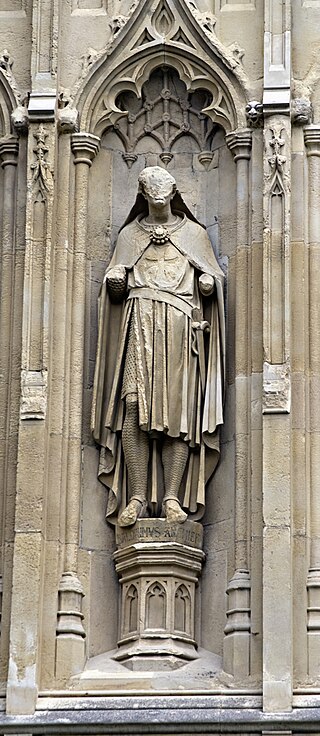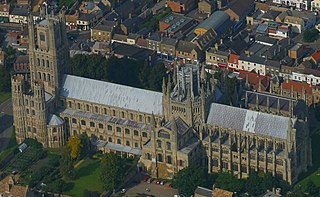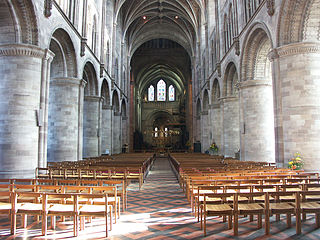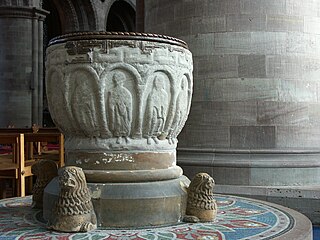Theobald of Bec was a Norman archbishop of Canterbury from 1139 to 1161. His exact birth date is unknown. Some time in the late 11th or early 12th century Theobald became a monk at the Abbey of Bec, rising to the position of abbot in 1137. King Stephen of England chose him to be Archbishop of Canterbury in 1138. Canterbury's claim to primacy over the Welsh ecclesiastics was resolved during Theobald's term of office when Pope Eugene III decided in 1148 in Canterbury's favour. Theobald faced challenges to his authority from a subordinate bishop, Henry of Blois, Bishop of Winchester and King Stephen's younger brother, and his relationship with King Stephen was turbulent. On one occasion Stephen forbade him from attending a papal council, but Theobald defied the king, which resulted in the confiscation of his property and temporary exile. Theobald's relations with his cathedral clergy and the monastic houses in his archdiocese were also difficult.
William de Vere was Bishop of Hereford and an Augustinian canon.
Uhtred is a masculine given name of Anglo-Saxon origin, prevalent during the Medieval period. It may refer to:

The Bishop of Llandaff is the ordinary of the Church in Wales Diocese of Llandaff.

Roger de Pont L'Évêque was Archbishop of York from 1154 to 1181. Born in Normandy, he preceded Thomas Becket as Archdeacon of Canterbury, and together with Becket served Theobald of Bec while Theobald was Archbishop of Canterbury. While in Theobald's service, Roger was alleged to have committed a crime which Becket helped to cover up. Roger succeeded William FitzHerbert as archbishop in 1154, and while at York rebuilt York Minster, which had been damaged by fire.

Baldwin of Forde or Ford was Archbishop of Canterbury between 1185 and 1190. The son of a clergyman, he studied canon law and theology at Bologna and was tutor to Pope Eugene III's nephew before returning to England to serve successive bishops of Exeter. After becoming a Cistercian monk he was named abbot of his monastery at Forde and subsequently elected to the episcopate at Worcester. Before becoming a bishop, he wrote theological works and sermons, some of which have survived.

Hervey le Breton was a Breton cleric who became Bishop of Bangor in Wales and later Bishop of Ely in England. Appointed to Bangor by King William II of England, when the Normans were advancing into Wales, Hervey was unable to remain in his diocese when the Welsh began to drive the Normans back from their recent conquests. Hervey's behaviour towards the Welsh seems to have contributed to his expulsion from his see. Although the new king, Henry I wished to translate Hervey to the see of Lisieux in Normandy, it was unsuccessful.

Alexander of Lincoln was a medieval English Bishop of Lincoln, a member of an important administrative and ecclesiastical family. He was the nephew of Roger of Salisbury, a Bishop of Salisbury and Chancellor of England under King Henry I, and he was also related to Nigel, Bishop of Ely. Educated at Laon, Alexander served in his uncle's diocese as an archdeacon in the early 1120s. Unlike his relatives, he held no office in the government before his appointment as Bishop of Lincoln in 1123. Alexander became a frequent visitor to King Henry's court after his appointment to the episcopate, often witnessing royal documents, and he served as a royal justice in Lincolnshire.

Gilbert Foliot was a medieval English monk and prelate, successively Abbot of Gloucester, Bishop of Hereford and Bishop of London. Born to an ecclesiastical family, he became a monk at Cluny Abbey in France at about the age of twenty. After holding two posts as prior in the Cluniac order he was appointed Abbot of Gloucester Abbey in 1139, a promotion influenced by his kinsman Miles of Gloucester. During his tenure as abbot he acquired additional land for the abbey, and may have helped to fabricate some charters—legal deeds attesting property ownership—to gain advantage in a dispute with the Archbishops of York. Although Foliot recognised Stephen as the King of England, he may have also sympathised with the Empress Matilda's claim to the throne. He joined Matilda's supporters after her forces captured Stephen, and continued to write letters in support of Matilda even after Stephen's release.

Nigel was an Anglo-Norman clergyman and administrator who served as Bishop of Ely from 1133 to 1169. He came from an ecclesiastical family; his uncle Roger of Salisbury was a bishop and government minister for King Henry I, and other relatives also held offices in the English Church and government. Nigel owed his advancement to his uncle, as did Nigel's probable brother Alexander, who like Nigel was advanced to episcopal status. Nigel was educated on the continent before becoming a royal administrator. He served as Treasurer of England under King Henry, before being appointed to the see, or bishopric, of Ely in 1133. His tenure was marked by conflicts with the monks of his cathedral chapter, who believed that Nigel kept income for himself that should properly have gone to them.

Hilary was a medieval bishop of Chichester in England. English by birth, he studied canon law and worked in Rome as a papal clerk. During his time there, he became acquainted with a number of ecclesiastics, including the future Pope Adrian IV, and the writer John of Salisbury. In England, he served as a clerk for Henry of Blois, who was the bishop of Winchester and brother of King Stephen of England. After Hilary's unsuccessful nomination to become Archbishop of York, Pope Eugene III compensated him by promoting him to the bishopric of Chichester in 1147.

Robert de Bethune was a medieval bishop of Hereford. From a knightly family, he became a teacher before becoming a canon by 1115. He was elected prior of Llanthony Priory in the middle 1120s, and was named bishop by King Henry I of England in 1130. As bishop, he was often appointed a judge by the papacy, and was known for the care he took of his diocese.

Robert Foliot was a medieval Bishop of Hereford in England. He was a relative of a number of English ecclesiastics, including Gilbert Foliot, one of his predecessors at Hereford. After serving Alexander, Bishop of Lincoln as a clerk, he became a clerk of Henry of Blois, the Bishop of Winchester and brother of King Stephen of England. He attended the Council of Reims in 1148, where another relative, Robert de Chesney, was elected as Bishop of Hereford. Chesney then secured the office of Archdeacon of Oxford for Foliot.
Robert de Chesney was a medieval English Bishop of Lincoln. He was the brother of an important royal official, William de Chesney, and the uncle of Gilbert Foliot, successively Bishop of Hereford and Bishop of London. Educated at Oxford or Paris, Chesney was Archdeacon of Leicester before his election as bishop in December 1148.
This article is about the particular significance of the century 1101–1200 to Wales and its people.
Events from the 1100s in England.
Sibyl de Neufmarché, Countess of Hereford, suo jure Lady of Brecknock, was a Cambro-Norman noblewoman, heiress to one of the most substantial fiefs in the Welsh Marches. The great-granddaughter of Gruffydd ap Llywelyn, king of Wales, Sibyl was also connected to the nobility of England and Normandy. Sibyl inherited the titles and lands of her father, Bernard de Neufmarché, Lord of Brecon, after her mother, Nest ferch Osbern, had declared her brother Mahel to have been illegitimate. Most of these estates passed to Sibyl's husband, Miles de Gloucester, 1st Earl of Hereford, as her dowry. Their marriage had been arranged personally by King Henry I of England in the spring of 1121. Sibyl, with her extensive lands, was central to the King's plans of consolidating Anglo-Norman power in south-east Wales by the merging of her estates with those of Miles, his loyal subject on whom he relied to implement Crown policy.
David FitzGerald was a medieval Bishop of St David's in Wales.
The Archdeacon of Llandaff is a senior ecclesiastical officer in the Church in Wales Diocese of Llandaff. The archdeacon is the senior priest with responsibility over the area of the archdeaconry of Llandaff, one of two archdeaconries in the diocese. The archdeaconry of Llandaff currently consists of two large deaneries: Cardiff, and Eglwysilan.
Iorwerth ab Owain was a Welsh prince of Gwynllŵg and Lord of Caerleon.








